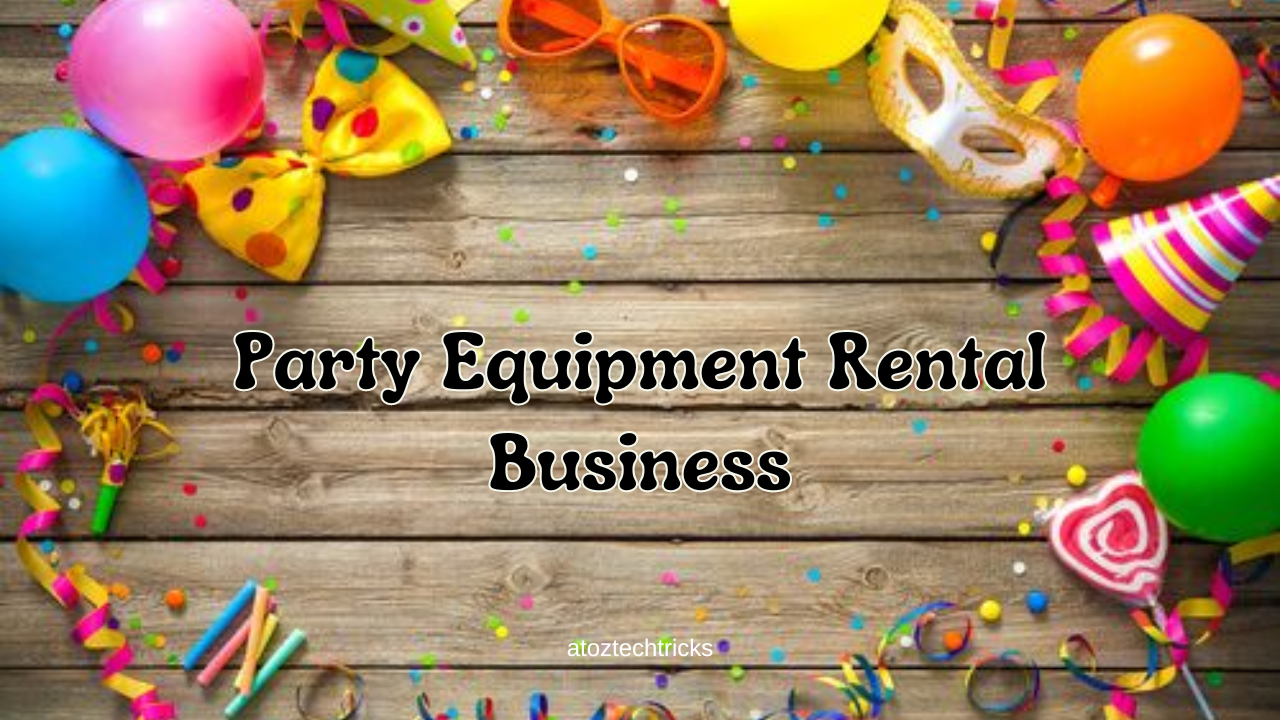Starting a Party Equipment Rental Business: A Comprehensive Guide
The party and event industry is booming, with celebrations for birthdays, weddings, corporate events, and festivals taking place year-round. A party equipment rental business offers a lucrative opportunity for entrepreneurs looking to break into this dynamic field. This guide will walk you through the essentials of starting and running a successful party equipment rental business, covering everything from market research and business planning to inventory management and customer service.
1. Understanding the Party Equipment Rental Industry
The party equipment rental industry provides various products for various events, including tables, chairs, tents, linens, lighting, sound systems, and more. The market is driven by individual customers and businesses, with demand peaking during the wedding season, holidays, and major corporate events.
As a business owner, your goal is to supply high-quality equipment that meets your customers’ needs while ensuring your operations are profitable and sustainable. Understanding market trends, customer preferences, and competition is crucial to positioning your business for success.
2. Conducting Market Research
Before diving into the party equipment rental business, it’s essential to conduct thorough market research. This step helps you understand your target market, assess the competition, and identify gaps in the market that you can fill.
- Target Market: Identify who your customers are. This could include individuals planning weddings, birthday parties, or family reunions, as well as businesses organizing corporate events, product launches, or holiday parties. Understanding your target market will help you tailor your product offerings and marketing strategies.
- Competitor Analysis: Analyze your competitors to see what they offer, their pricing strategies, and customer service approaches. Visit their websites, read customer reviews, and even consider renting from them to experience their service firsthand. This research will give you insights into how you can differentiate your business.
- Market Trends: Stay informed about trends in the event industry. For example, eco-friendly events are becoming more popular, leading to increased demand for sustainable and reusable equipment. Similarly, themed parties might require specialized equipment, presenting an opportunity for niche markets.
3. Developing a Business Plan
A well-structured business plan is your roadmap to success. It outlines your business goals, strategies, and the steps you need to take to achieve them. Here’s what to include in your business plan:
- Executive Summary: A brief overview of your business, including your mission statement, business model, and the products and services you’ll offer.
- Market Analysis: Summarize your market research, highlighting key findings about your target market, competitors, and market trends.
- Business Structure: Decide on your business structure (e.g., sole proprietorship, partnership, LLC) and outline your organizational structure, including key roles and responsibilities.
- Product Offerings: Detail the types of equipment you’ll rent, such as tents, tables, chairs, linens, lighting, sound systems, and decorations. Consider offering packages tailored to different event types, such as weddings or corporate events.
- Marketing Strategy: Describe how you’ll attract and retain customers. This could include online marketing, social media, partnerships with event planners, and attending local trade shows.
- Financial Plan: Outline your startup costs, pricing strategy, revenue projections, and break-even analysis. Consider the cost of purchasing or leasing equipment, insurance, marketing, and operating expenses.
- Operations Plan: Detail how you’ll manage day-to-day operations, including inventory management, delivery and setup, customer service, and staffing.
4. Securing Financing
Starting a party equipment rental business requires a significant initial investment. You’ll need to purchase or lease equipment, secure storage space, and possibly buy delivery vehicles. Here are some options for financing your business:
- Personal Savings: Using personal savings is a common way to fund a new business, but it carries the risk of depleting your financial reserves.
- Bank Loans: Traditional bank loans offer a lump sum of capital, but they require a strong credit history and a solid business plan.
- Small Business Grants: Some local governments and organizations offer grants to small businesses, especially those in underserved communities.
- Investor Funding: Bringing in investors can provide significant capital, but you’ll need to give up some control or ownership in your business.
- Equipment Financing: Many equipment suppliers offer financing options, allowing you to pay for equipment over time rather than upfront.
5. Acquiring Equipment
The quality and variety of your equipment are critical to your business’s success. Customers expect clean, well-maintained, and up-to-date equipment for their events. Here’s how to approach equipment acquisition:
- Identify Essential Equipment: Start with the basics that every event requires, such as tables, chairs, and tents. From there, expand to more specialized items like lighting, sound systems, and décor.
- Consider Quality and Durability: Invest in high-quality, durable equipment that can withstand frequent use and transport. While it may be tempting to cut costs with cheaper items, lower-quality equipment can lead to customer dissatisfaction and higher maintenance costs.
- Explore Supplier Options: Research multiple suppliers to compare prices, quality, and warranty options. Building a relationship with a reliable supplier can lead to better deals and service in the long run.
- Plan for Storage: Secure a storage space that is clean, dry, and organized. Proper storage is essential to maintain the quality and longevity of your equipment.
- Maintain an Inventory System: Implement an inventory management system to track equipment availability, condition, and usage. This will help you avoid double bookings and ensure timely maintenance and repairs.
6. Legal Considerations
Operating a party equipment rental business involves several legal considerations, from registering your business to obtaining the necessary licenses and insurance.
- Business Registration: Register your business with the appropriate state and local authorities. Choose a business name that reflects your brand and isn’t already in use.
- Licenses and Permits: Depending on your location, you may need specific licenses and permits to operate a rental business. Check with your local government to determine what’s required.
- Insurance: Insurance is critical in protecting your business from potential liabilities. Consider general liability insurance to cover accidents or damage to rental equipment, as well as property insurance for your storage space. Worker’s compensation insurance is also necessary if you have employees.
- Contracts and Agreements: Develop clear rental agreements that outline the terms of service, including pricing, delivery, setup, and return conditions. Your contract should also cover potential damages, late returns, and cancellation policies.
7. Setting Up Operations
Efficient operations are key to running a successful party equipment rental business. From inventory management to customer service, every aspect of your operations should be streamlined and customer-focused.
- Inventory Management: Use inventory management software to track your equipment, manage bookings, and schedule maintenance. An organized system reduces errors and ensures that you can fulfil customer orders on time.
- Delivery and Setup: Plan your logistics for delivery and setup. Invest in reliable vehicles and hire skilled drivers who understand the importance of timely and careful delivery. Offering setup and takedown services can be a significant value-add for customers.
- Maintenance and Cleaning: Regular maintenance and cleaning of your equipment are crucial to maintaining its quality and safety. Establish a routine maintenance schedule and invest in proper cleaning tools and supplies.
- Customer Service: Excellent customer service is vital to building a loyal customer base. Train your staff to be courteous, professional, and responsive to customer inquiries and concerns. Consider offering a customer service hotline or online chat support.
8. Marketing Your Business
Marketing is essential to attract customers and grow your party equipment rental business. A strong marketing strategy will help you reach your target market and differentiate your business from competitors.
- Build an Online Presence: Create a professional website showcasing your products, services, and pricing. Include high-quality photos of your equipment in use at events, along with customer testimonials. Optimize your site for search engines (SEO) to attract organic traffic.
- Leverage Social Media: Use social media platforms like Instagram, Facebook, and Pinterest to showcase your products and engage with potential customers. Share photos from events, promotions, and behind-the-scenes content to build your brand.
- Network with Event Planners: Build relationships with event planners, caterers, and venues who can refer clients to your business. Attend local trade shows, bridal expos, and networking events to connect with industry professionals.
- Offer Promotions and Discounts: Attract new customers with promotions and discounts. Consider offering a discount for first-time customers or package deals for larger events.
- Collect and Showcase Reviews: Encourage satisfied customers to leave reviews on your website, Google, and social media pages. Positive reviews build trust and attract new customers.
Virtual Reality Gaming and Entertainment: Revolutionizing the Future of Fun
9. Managing Finances
Proper financial management is critical to the long-term success of your party equipment rental business. Keeping your finances in order helps you maintain profitability, manage cash flow, and make informed business decisions.
- Set Pricing Strategically: Your pricing should cover your costs and generate a profit while remaining competitive. Consider factors like the cost of equipment, maintenance, delivery, and setup when setting prices. You may also want to offer tiered pricing for different levels of service or package deals for large events.
- Monitor Cash Flow: Regularly track your cash flow to ensure that you have enough funds to cover operating expenses, pay off debts, and invest in new equipment. Use accounting software to keep accurate records and generate financial reports.
- Plan for Taxes: Understand your tax obligations, including sales tax, income tax, and any local business taxes. Work with an accountant to ensure that you’re in compliance and take advantage of any tax deductions available to your business.
- Budget for Growth: As your business grows, you’ll need to reinvest profits into expanding your inventory, marketing efforts, and operational capacity. Create a budget that allocates funds for growth initiatives and unexpected expenses.
10. Scaling Your Business
Once your party equipment rental business is established, you may want to explore growth opportunities. Scaling your business can increase your revenue and market share, but it requires careful planning and execution.
- Expand Your Inventory: As demand grows, consider expanding your inventory to include more specialized equipment, such as luxury linens, high-end lighting, or themed decorations. This allows you to cater to a wider range of events and attract more customers.
- Diversify Your Services: Consider offering additional services, such as event planning, catering, or entertainment booking. This can turn your business into a one-stop shop for customers and increase your revenue streams.
- Open Additional Locations: If your business is successful in one area, you may want to open additional locations to serve a broader market. This requires significant investment and management, so be sure to conduct thorough market research and financial planning before expanding.
- Franchise Your Business: If your business model is proven and successful, franchising can be a way to scale quickly. This involves selling the rights to your business model to other entrepreneurs, who will operate their locations under your brand.
- Invest in Technology: As your business grows, invest in technology to streamline operations and improve customer service. This could include upgrading your inventory management system, launching an e-commerce platform for online bookings, or implementing customer relationship management (CRM) software.

11. Challenges and How to Overcome Them
Like any business, the party equipment rental industry comes with its challenges. Being aware of these challenges and knowing how to overcome them is crucial for long-term success.
- Seasonality: Demand for party equipment is often seasonal, with peaks during the wedding season and holidays. To overcome seasonality, diversify your offerings to include equipment for off-season events, such as corporate meetings or holiday parties.
- Equipment Damage: Rental equipment is subject to wear and tear, and damage is inevitable. Implement a robust maintenance and repair schedule to keep equipment in good condition. Consider offering insurance options to customers to cover accidental damage.
- Competition: The party equipment rental industry is competitive, with many businesses vying for the same customers. Differentiate your business by offering unique products, exceptional customer service, and competitive pricing.
- Logistics Management: Coordinating deliveries, setups, and takedowns for multiple events can be challenging. Invest in logistics management software and hire experienced staff to ensure smooth operations.
- Cash Flow Issues: Managing cash flow can be difficult, especially when dealing with large upfront costs for equipment purchases. Maintain a cash reserve for emergencies and work with an accountant to create a cash flow management plan.
Starting a party equipment rental business can be a rewarding and profitable venture for entrepreneurs who are passionate about events and customer service. By conducting thorough market research, developing a solid business plan, and focusing on quality, customer service, and efficient operations, you can build a successful business that meets the needs of your customers and stands out in a competitive market.
Remember, the key to success in this industry is adaptability. As trends and customer preferences evolve, be willing to adjust your offerings, marketing strategies, and business operations to stay ahead of the curve. With dedication and hard work, your party equipment rental business can become a go-to resource for memorable events in your community.





Post Comment